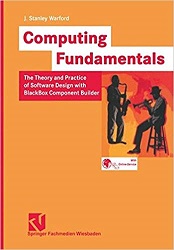
|
FreeComputerBooks.com
Links to Free Computer, Mathematics, Technical Books all over the World
|
|
- Title: Computing Fundamentals: The Theory and Practice of Software Design with BlackBox Component Builder
- Authors J. Stanley Warford
- Publisher: Vieweg+Teubner Verlag; eBook (Creative Commons Licensed)
- License(s): Creative Commons License (CC)
- Paperback: 631 pages
- eBook: PDF (628 pages)
- Language: English
- ISBN-10: 3528058285
- ISBN-13: 978-3528058289
- Share This:

|
This is the first English book on Component Pascal and BlackBox Component Builder.
The book introduces the reader to computer programming, i.e. algorithms and data structures. It covers many new programming concepts that have emerged in recent years including object-oriented programming and design patterns.
The book emphasizes the practical aspects of software construction without neglecting their solid theoretical foundation.
About the Authors- Professor J. Stanley Warford was an aerospace engineer before turning to academia. He is currently the Chair of the Computer Science Department at Seaver College of Pepperdine University, where he has taught for more than 40 years. He earned his MS degree from Rensselaer Polytechnic Institute and his PhD from UCLA. Professor Warford is a Luckman Distinguished Teaching Fellow, holds the Howard A. White Award for Teaching Excellence and held the Frank R. Seaver Professorship in the Science Division at Pepperdine University.
- Theory of Computation
- Pascal and Delphi Programming
- Computer Programming
- Object-Oriented Analysis, Design, and Programming (OOA/OOD/OOP)
- Introduction to Computer Science

- Computing Fundamentals: The Theory and Practice of Software Design (J. Stanley Warford)
- The Mirror Site (1) - PDF
-
 Matters Computational: Ideas, Algorithms, Source Code
Matters Computational: Ideas, Algorithms, Source Code
This book provides algorithms and ideas for computationalists, whether a working programmer or anyone interested in methods of computation. The implementations are done in C++ and the GP language, written for POSIX-compliant platforms.
-
 A Data-Centric Introduction to Computing (Kathi Fisler, et al)
A Data-Centric Introduction to Computing (Kathi Fisler, et al)
This book is an introduction to computer science. It will teach you to program, and do so in ways that are of practical value and importance. It uses a data-centric approach: data centric = data science + data structures.
-
 Introduction to Classical and Quantum Computing (Tom Wong)
Introduction to Classical and Quantum Computing (Tom Wong)
This book is for students who want to learn quantum computing beyond a conceptual level, but who lack advanced training in mathematics. The only prerequisite is trigonometry, and mathematics beyond that will be covered.
-
 Soft Computing: Techniques in Engineering Sciences
Soft Computing: Techniques in Engineering Sciences
Soft Computing is used where a complex problem is not adequately specified for the use of conventional math and computer techniques. This book elaborates on the most recent applications of Soft Computing in various fields of engineering.
-
 Quantum Computing: Progress and Prospects
Quantum Computing: Progress and Prospects
Provides an introduction to the Quantum Computing, including the unique characteristics and constraints of the technology, and assesses the feasibility and implications of creating a functional quantum computer capable of addressing real-world problems.
-
 Models of Computation: Exploring the Power of Computing
Models of Computation: Exploring the Power of Computing
It covers the traditional topics of formal languages, automata and complexity classes, as well as an introduction to the more modern topics of space-time tradeoffs, memory hierarchies, parallel computation, the VLSI model, and circuit complexity.
-
 Foundations of Computation (Carol Critchlow, et al)
Foundations of Computation (Carol Critchlow, et al)
It includes topics from discrete mathematics, automata theory, formal language theory, and the theory of computation, along with practical applications to computer science. The course has no prerequisites other than introductory computer programming.
-
 Introduction to Theory of Computation (Anil Maheshwari, et al)
Introduction to Theory of Computation (Anil Maheshwari, et al)
This is a textbook on formal languages, automata theory, and computational complexity. This text strikes a good balance between rigor and an intuitive approach to computer theory.
-
 Introduction to Theory of Computation (Eitan M. Gurari)
Introduction to Theory of Computation (Eitan M. Gurari)
This book explores some of the more important terminologies and questions concerning programs, computers, problems, and computation. The exploration reduces in many cases to a study of mathematical theories, such as those of automata and formal languages; theories that are interesting also in their own right.
-
 Theory of Computation, Making Connections (Jim Hefferon)
Theory of Computation, Making Connections (Jim Hefferon)
The book is geared toward those who thirst for computation theory knowledge. To cater to the demands of a wide range of people, the principles in this book are explained in a way that is easy to understand, digest and apply in the upcoming career.
-
 Mathematics and Computation (Avi Wigderson)
Mathematics and Computation (Avi Wigderson)
This book provides a broad, conceptual overview of computational complexity theory - the mathematical study of efficient computation. With important practical applications to computer science and industry, computational complexity theory, etc.





